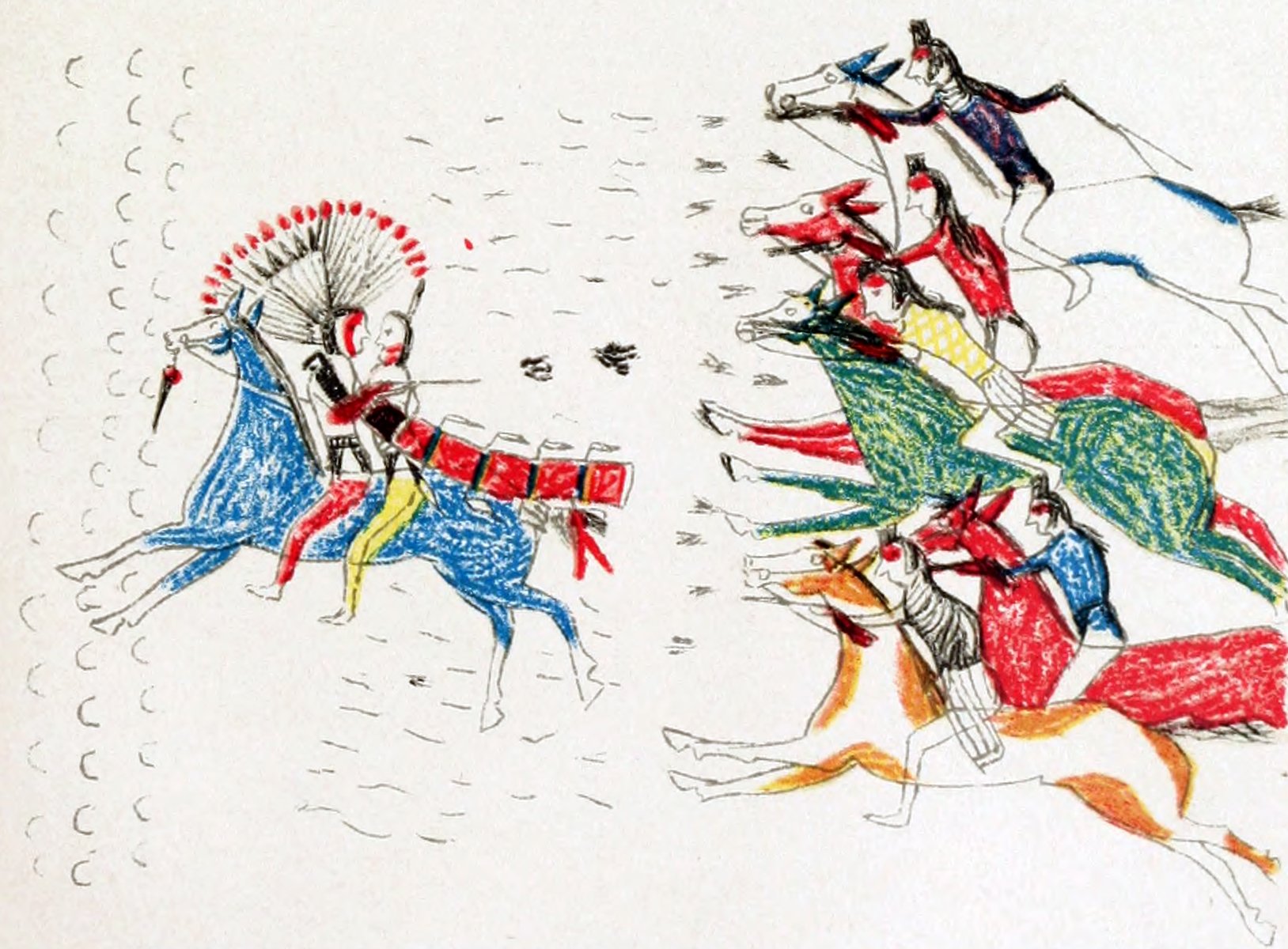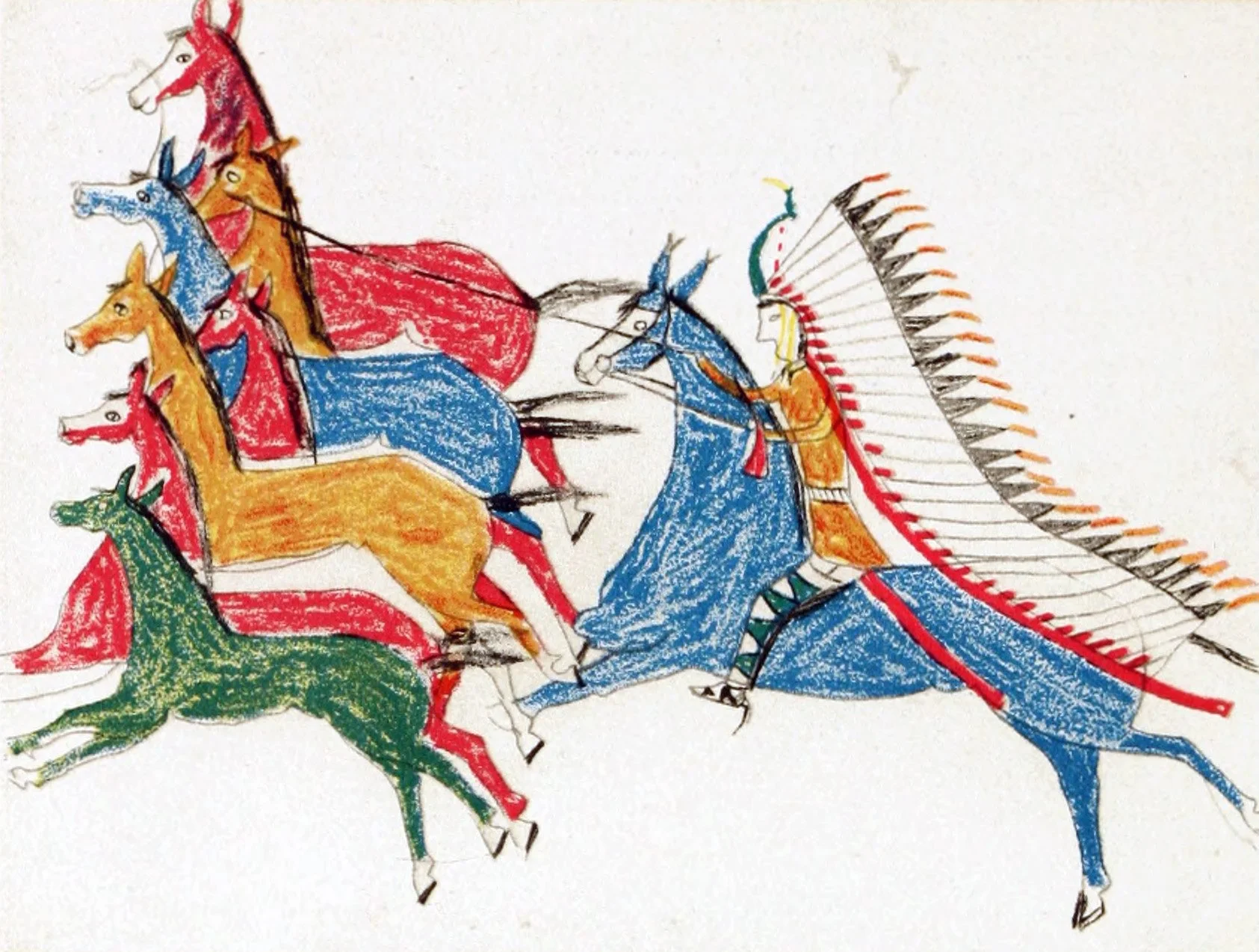
The Testimony of Eagle Shield
From Teton Sioux Music by Frances Densmore:
In the time of ripe cherries, a party of Sioux were in the country of the Assiniboin. There they found a little group of cherry pickers and attacked them. This act was seen by the Assiniboin in the camp, who charged the Sioux in a vain attempt to save the cherry pickers. All the men were killed, but the women escaped with the exception of one whom Eagle Shield captured, carrying her away on his horse. Eagle Shield took the captured woman to the Sioux camp, but the next autumn she ran away and returned to her own people.
The month of July is called by the Sioux Čhaŋpȟásapa Wi,' (black-cherry moon).
Plate 66, A, Eagle Shield captures horses (drawing by himself)
The narrative of another exploit illustrated by Plate 66, B, runs thus: Eagle Shield said that the advance section of the war party deserted their leader, who was wounded in the knee, leaving him to the mercy of the enemy. Eagle Shield was a member of the second section of the war party. When he saw the leader's plight he went to him and succeeded in carrying him to a place of safety. In connection with the event he sang a song, the words of which express derision for warriors who would desert their wounded leader.
Plate 66, B, Eagle Shield rescues a wounded friend (drawing by himself)
Eight of Eagle Shield's companions made a litter of poles and placed the wounded man upon it. They were 50 miles from home and were obliged to cross the Missouri River with their burden. After traveling about 2.5 miles they made a camp and also killed a buffalo. Food for a war party was obtained from the country through which it passed. Mention is frequently made of the killing of buffalo, the flesh being used for food and the hide for robes or for making moccasins.
The wounded man wanted soup, but the party carried no utensil large enough for boiling meat. Eagle Shield, remembering, however, that his grandfather told him how the warriors of his day cooked meat in the stomach casing of the slain animal, resolved to try the experiment. The casing, suspended on a tripod, was filled with water in which heated stones were placed.
Plate 68, B, Eagle Shield captures horses in Crow camp (drawing by himself)
When the water was boiling the meat was put into it, and the process of cooking was accomplished without difficulty.
The wounded man was refreshed by the broth, and after making him comfortable and cooking a quantity of meat, the war party left him in charge of a young man. Eight days later another war party passing that way found the wounded man able to travel. He and his companion joined this war party and reached home in safety.
As Eagle Shield, who gave this narrative, is a Medicine Man who makes a specialty of treating wounds and fractures, his account of the man's injury was somewhat professional. He said the injury was so severe that at first the bones protruded and buckshot came from the wound for some time, after which the flesh began to heal, and that in one moon and the first quarter of the next moon the leg was entirely well.
Plate 68, A, Eagle Shield is pursued by Crow Indians (drawing by himself)
On one occasion when Eagle Shield led a war party against the Crows they found that the latter had picketed their horses within the circle of tents. Eagle Shield and a companion, having entered the village as scouts, saw these horses (Plate 68, B). Eagle Shield said to his companion, “Let us go and get some of the horses.” His companion replied, “No, if we do that the rest of the party will be angry.” Eagle Shield then said, “Let us each take one horse.” His companion replied, “You do it.” Thereupon Eagle Shield, creeping into the circle of tents, took two horses, a black and a brown, and escaped without detection. Each mounting a horse, he and his companion reached their camp about daybreak.
Waŋblí Waháčhaŋka (Eagle Shield)
The loss of the horses was soon discovered by the Crows, who increased their watchfulness, so that the other members of the Sioux war party were unable to secure any horses. So it happened that Eagle Shield and his companion were the only ones who returned on horseback, the rest being obliged to walk.
Eagle Shield said that he sang the following song when he went to steal the Crow horses:
Song No. 169. “I Intend to Take His Horses”

Next: About Frances Densmore
I Intend to Take His Horses
Sung by John Eagle Shield, Jr.
Song No. 169 • Catalog No. 522
Densmore recording sung by Waŋblí Waháčhaŋka (Eagle Shield)





